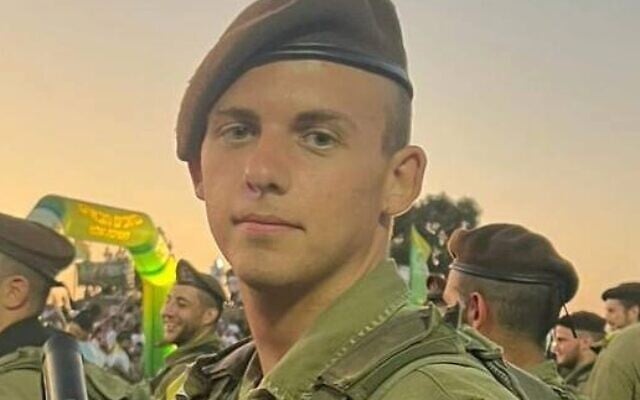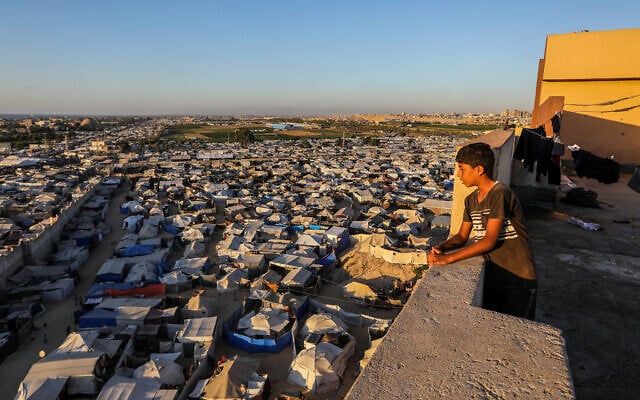


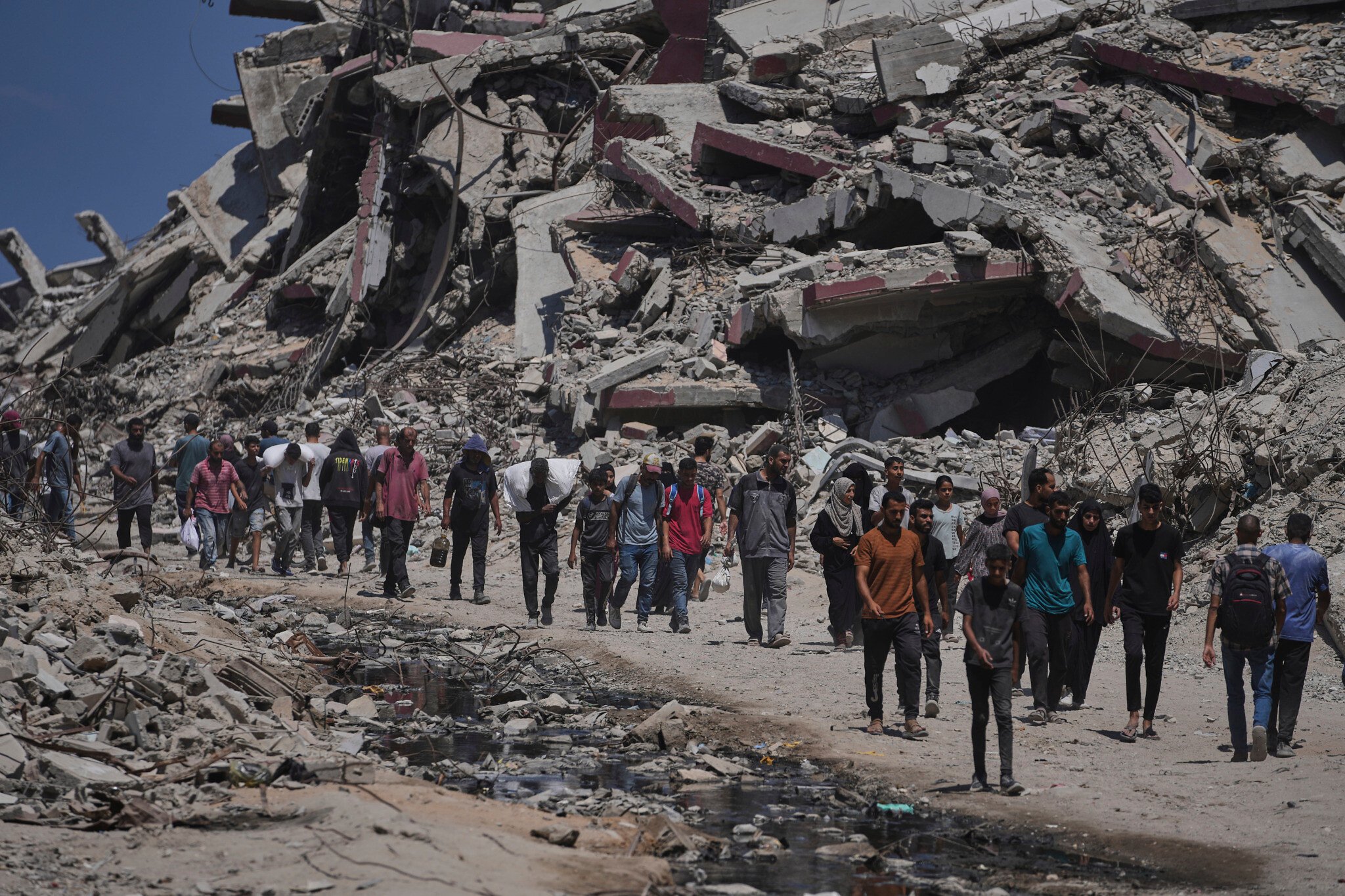
An Israeli soldier was killed by an explosion in southern Gaza on Monday, the Israel Defense Forces announced, as troops began ground operations in the Deir al-Balah area in the Strip’s center for the first time since the beginning of the war.
The soldier was named as Staff Sgt. Amit Cohen, 19, of the Golani Brigade’s 13th Battalion, from Holon.
According to a preliminary IDF investigation, Cohen was killed by a blast from Israeli military munitions that detonated inside a building in Khan Younis.
The explosion also seriously wounded an officer in the 13th Battalion, the IDF said.
The military said it was further investigating the cause of the explosion, including the possibility that it was an “operational accident.”
Cohen’s death brought Israel’s toll in the ground offensive against Hamas in Gaza and in military operations along the border with the Strip to 455.
Earlier Monday, media in Gaza reported that IDF tanks had pushed into the southern and eastern districts of Deir al-Balah.
It is one of the few places in the Strip where the IDF has, until now, not operated with ground troops because it believed Hamas to be holding hostages there, though it has conducted airstrikes in the city. Hamas has vowed to execute captives if the IDF approaches.
As a matter of policy, the IDF has said it avoids ground operations in areas of Gaza where it believes Hamas to be holding hostages or cannot rule out the presence of captives, in order not to endanger them.
The push into the southeast of Deir al-Balah was being led by troops of the Golani Infantry Brigade, along with tanks and combat engineers, according to military sources. The ground operations came after Palestinian reports of artillery shelling and airstrikes overnight and on Monday morning in the area.
A day earlier, the IDF issued an evacuation warning for several zones in the southwest of Deir al-Balah, where many Palestinians had sought refuge. According to United Nations figures, between 50,000 and 80,000 people were in the area when Sunday’s evacuation order was issued.
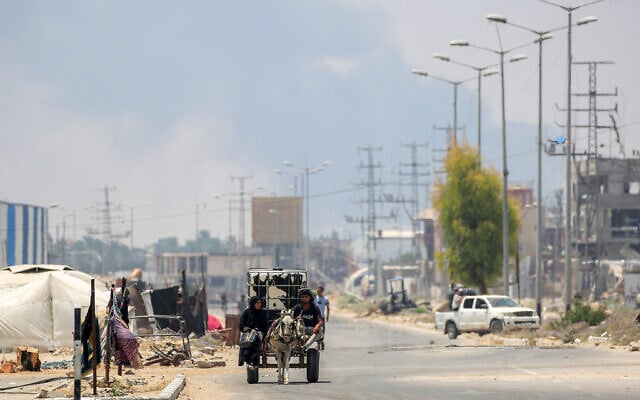
Sunday’s announcement told civilians to head south to the Mawasi area on the coast, where at least 600,000 Palestinians were already massed.
Following reports of the IDF’s push toward the city, the Hostages and Missing Families Forum said it was “shocked and alarmed” at the decision, and the mother of one of the hostages thought to be alive said she was perplexed by it.
The expanded military operation commenced as global criticism mounted over the war and the US- and Israeli-backed aid distribution mechanism in Gaza. At the same time, negotiations over a ceasefire and hostage release deal were ongoing in Qatar. Should those talks prove fruitless, the IDF is proposing a further intensification of the fighting, even as it acknowledges burnout among troops after more than 21 months of war.
Deir al-Balah resident Abdullah Abu Saleem, 48, told AFP that “during the night, we heard huge and powerful explosions shaking the area, as if it were an earthquake,” which he attributed to “artillery shelling in the south-central part of Deir al-Balah and the southeastern area.”
“We are extremely worried and fearful that the army is planning a ground operation in Deir al-Balah and the central camps where hundreds of thousands of displaced people are sheltering,” he said.
Local medics said tank shelling in the area hit houses and mosques, killing at least three Palestinians and wounding several others. At least 130 Palestinians were killed and more than 1,000 wounded by Israeli gunfire and military strikes across the territory in the past 24 hours, Gaza’s Hamas-run health ministry said Monday.
The ministry’s figures cannot be verified and do not differentiate between civilians and fighters. Israel has said it seeks to minimize civilian fatalities and stresses that Hamas uses Gaza’s civilians as human shields, fighting from civilian areas, including homes, hospitals, schools, and mosques.
Also on Monday, Marwan al-Hams, an official in the Hamas-run health ministry in Gaza, was reportedly detained by an undercover Israeli force outside the field hospital of the International Committee of the Red Cross in the southern Gaza Strip.
Hams is the director of Yusuf al-Najjar Hospital in the city of Rafah, and also serves as the head of all field hospitals in the Gaza Strip.
The Hamas health ministry said that Hams was on his way to visit the ICRC hospital in Rafah when an Israeli force “abducted” him after opening fire, killing one person and wounding another civilian nearby.
Medics said the person killed was a local journalist who was filming an interview with Hams when the incident happened.
An ICRC spokesperson said the ICRC hospital had admitted and treated patients injured in the incident but would not comment further on their status in order to protect their privacy. It said it was “very concerned about safety and security” around the field hospital.
The IDF did not immediately comment on the incident.
Meanwhile, the Hostages and Missing Families Forum, which represents the relatives of many of the 50 remaining hostages, at least 20 of whom are believed to be alive, asked the government to explain the move into Deir al-Balah.
“The families demand that the prime minister, defense minister, chief of staff, and IDF spokesperson appear before them and the Israeli public this evening to clearly explain why the offensive in the Deir al-Balah area does not put the hostages at serious risk,â€� said the group. “The people of Israel will not forgive anyone who knowingly endangered the hostages — both the living and the deceased.”
Ruhama Bohbot, whose son Elkana Bohbot is held captive by Hamas and thought to be alive, told a gathering of supporters Monday that she felt “a little tense” over the military’s entry into the city.
“The IDF have begun operating in Gaza in the place where Elkana is being held, and I’m a little worried and suspicious like the other families,â€� Bohbot said. “I don’t have any idea why they started doing this now — now, when there’s supposed to be a deal.â€�
“I hope that the army will know what to do and how to do it,â€� she said. “And God forbid not touch the hostages. The government said it wouldn’t be the worst thing if some hostages were harmed, an unbelievably terrible thing to say.”
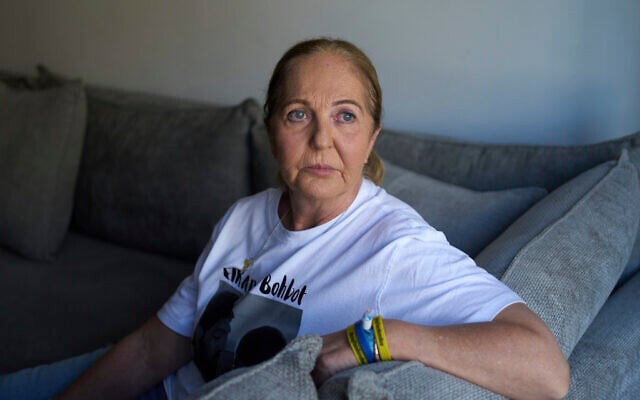
It was an apparent reference to Orit Strock, the minister of national missions and settlements, who said in an interview Monday that while the IDF should make a “great effort” to avoid harming hostages, “it’s not right to refrain from vanquishing Hamasâ€� in areas where they might be held.
“That also risks lives,� said Strock, a member of the far-right Religious Zionism party, adding that she “cannot make calculations about whether this person’s life is more important than that person’s life.�
Negotiations over a 60-day ceasefire that would see the release of about half the hostages are continuing in Qatar, though difficulties reaching Hamas’s Gaza leadership are reportedly slowing the process. Should those talks fail, IDF Chief of Staff Lt. Gen. Eyal Zamir was drawing up plans for an expansion of the fighting.
A Channel 12 news report that quoted sources familiar with the proposal described it as “the plan for taking over Gaza,” and said it was an alternative to the controversial “humanitarian cityâ€� in Rafah pushed by Prime Minister Benjamin Netanyahu and Defense Minister Israel Katz, which Zamir opposes.
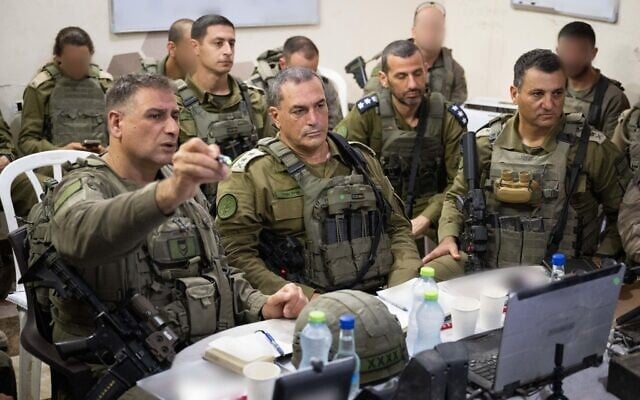
Global criticism of the war, and reports of a growing humanitarian crisis in Gaza, mounted on Monday. In a call for the war to end, 25 countries zeroed in on criticism of the Gaza Humanitarian Foundation, which began operating aid distribution sites in May under American and Israeli backing.
Hundreds of people have been reported killed around the sites, according to Hamas officials. Israel has acknowledged deaths near aid sites and has confirmed that troops have fired warning shots when crowds have gotten too close, but says the death tolls, which mostly come from Hamas-run authorities, are exaggerated.
The UN’s World Food Program, in a rare condemnation, said a crowd surrounding its aid convoy in northern Gaza on Sunday “came under fire from Israeli tanks, snipers and other gunfire.â€� It said “countless livesâ€� were lost. Hamas authorities reported nearly 80 dead from Israeli gunfire in the area of the convoy, which is unrelated to the GHF aid distribution sites.
Responding to the reports, the IDF said it had fired “warning shots to remove an immediate threat posed to the troops� in northern Gaza, but denied the steep death toll, insisting that the “reported number of casualties does not align with the existing information.�
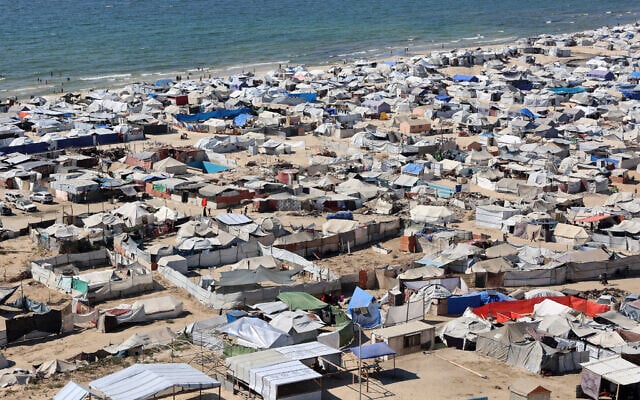
An Israeli reservist told the Wall Street Journal that soldiers fired at aid-seeking Palestinians who veered off approved paths even though some of them were carrying white flags. The report, published Monday, said that Israeli soldiers fired on Palestinians who strayed from the paths or came too close to the troops.
“We have an unwritten rule that if you are worried and they get too close and you see that it could be something that puts you and your team at risk, you don’t take that risk,� the reservist said.
A spokesman for the GHF, Chapin Fay, said Monday that it was willing to deliver food to Palestinians for the UN, which he says “has given up distribution altogether.� He added that “desperation levels� in Gaza are rising.
“We can get their aid into Gaza safely and securely and have offered to help repeatedly, but they continue to reject our offers,� Fay said in a media briefing.
The UN has argued that it will not cooperate with the GHF, as its distribution mechanism has placed Palestinians at risk.
UN Secretary-General Antonio Guterres on Monday condemned the “accelerating breakdown of humanitarian conditions” in Gaza.
“The last lifelines keeping people alive are collapsing,” his spokesman said in a statement. The United Nations chief “deplores the growing reports of children and adults suffering from malnutrition.”
Jessica Steinberg, agencies and Times of Israel staff contributed to this report.

